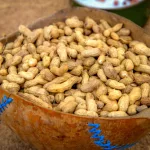What is Nigerian Groundnut (Peanuts)
Nigerian groundnuts, also known as peanuts, are a popular and versatile legume widely cultivated and consumed in Nigeria. These small, oval-shaped nuts are technically not true nuts but belong to the legume family. They are known by different names in various regions of Nigeria, such as “groundnut,” “peanut,” or “monkey nut.”
Read, Also >>>>>> A Comprehensive Guide to Nutritional, Health Benefits, and Chemical Properties of Nigerian Cocoa
Nigerian groundnuts are an essential part of the country’s culinary culture and are used in a variety of ways in Nigerian cuisine. Let’s explore some of the key aspects of Nigerian groundnuts:
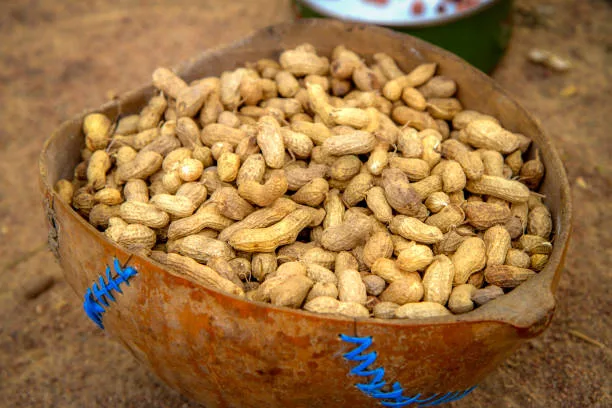
Cultivation: Nigerian groundnuts are typically grown in the country’s northern regions, where the climate and soil conditions are suitable for their cultivation. They are an important cash crop for many Nigerian farmers.
Varieties: There are different varieties of groundnuts grown in Nigeria, with variations in size, color, and taste. Some popular varieties include the ‘Spanish’ and ‘Valencia’ types.
Nutritional Value: Nigerian groundnuts are not only delicious but also nutritious. They are a good source of protein, healthy fats, vitamins, and minerals. They provide essential nutrients like niacin, folate, and vitamin E.
Culinary Uses: Groundnuts are a versatile ingredient in Nigerian cuisine. They can be enjoyed in various forms, including roasted, boiled, or ground into a paste. Groundnut soup, also known as “peanut soup,” is a well-loved dish in Nigeria. Groundnut oil, which is extracted from these nuts, is used for cooking and frying.
Snack: Roasted groundnuts are a popular snack in Nigeria. They are often sold by street vendors and can be enjoyed with a sprinkle of salt or spices.
Groundnut Butter: Groundnuts are also used to make creamy and delicious peanut butter, which can be spread on bread or used as a snack dip.
Groundnut Farming: Groundnut farming is an important agricultural activity in Nigeria, contributing to the livelihood of many farmers. The cultivation of groundnuts provides both food and income for local communities.
Economic Importance: Groundnuts are not only a staple food but also a valuable cash crop. Nigeria is one of Africa’s leading producers of groundnuts, and the export of groundnut products contributes to the country’s economy.
Nigerian groundnuts, or peanuts, are a fundamental part of the country’s culture, cuisine, and economy. They are enjoyed in various forms, from traditional dishes to snacks and peanut butter. These small legumes play a big role in the lives of Nigerians, both as a source of nutrition and income for many.
Comparative Analysis of Nigerian groundnuts
Let’s do a comparative analysis of Nigerian groundnuts (peanuts) to understand their unique characteristics and how they compare to groundnuts from other regions.
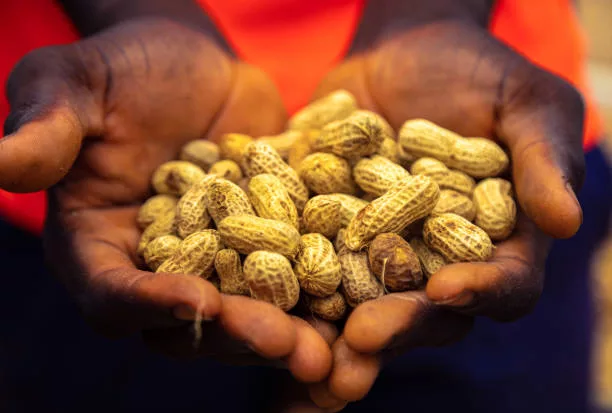
1. Variety and Types:
- Nigerian Groundnuts: Nigeria is home to several varieties of groundnuts, with variations in size, color, and flavor. Popular Nigerian groundnut varieties include the ‘Spanish’ and ‘Valencia’ types.
- Comparative Perspective: Groundnuts are grown in various regions worldwide, and each region may have its unique varieties, depending on climate and soil conditions. For example, Virginia and Runner are popular groundnut varieties in the United States.
2. Culinary Uses:
- Nigerian Groundnuts: Nigerian groundnuts are a staple in the country’s cuisine. They are used to make groundnut soup and stew and are enjoyed as roasted snacks or groundnut butter, commonly known as peanut butter.
- Comparative Perspective: In other parts of the world, groundnuts are used in various cuisines. For instance, they are often eaten as peanut butter and jelly sandwiches in the United States. In Southeast Asia, they are used in satay sauce, and in China, they are featured in Kung Pao dishes.
3. Nutritional Value:
- Nigerian Groundnuts: Nigerian groundnuts are rich in protein, healthy fats, vitamins (like niacin and vitamin E), and minerals. They offer a good balance of nutrition.
- Comparative Perspective: Groundnuts, regardless of their origin, are generally nutrient-dense and provide essential nutrients, making them a valuable food source.
4. Regional Cultivation:
- Nigerian Groundnuts: Nigeria’s northern regions are known for groundnut cultivation, and it’s a significant cash crop for local farmers.
- Comparative Perspective: Groundnuts are cultivated in many countries across the globe, including the United States, China, India, Senegal, and Argentina, among others. Each region’s cultivation methods and practices can vary.
5. Economic Importance:
- Nigerian Groundnuts: Groundnut farming and trade are economically vital in Nigeria, providing livelihoods for many and contributing to the country’s economy through exports.
- Comparative Perspective: Groundnuts have economic significance in various countries, and they often play a role in international trade, especially for oilseed production.
6. Cultural Significance:
- Nigerian Groundnuts: Nigerian groundnuts are deeply embedded in the country’s culture and cuisine, used in traditional dishes, and enjoyed as snacks.
- Comparative Perspective: Groundnuts are culturally significant in many regions and are often used in rituals, celebrations, and traditional dishes. For example, in the United States, peanuts are closely associated with baseball games and circuses.
7. Challenges and Opportunities:
- Nigerian Groundnuts: Nigerian groundnut farmers face challenges such as pests, diseases, and post-harvest losses. However, there are opportunities for improved farming practices and value addition in groundnut products.
- Comparative Perspective: Groundnut farming faces similar challenges in other regions, and there are ongoing efforts to enhance production and address these challenges through research and innovation.
Nigerian groundnuts have their unique characteristics and cultural significance, much like groundnuts in other parts of the world. While the specific varieties and culinary uses may differ, groundnuts globally remain a valuable source of nutrition, income, and cultural identity for many communities. Understanding these similarities and differences can provide insights into the diverse ways groundnuts are appreciated and utilized worldwide.
Nutritional Properties of Nigerian Groundnuts
These little legumes are not only delicious but also packed with various nutrients. Here’s a breakdown of their nutritional content:
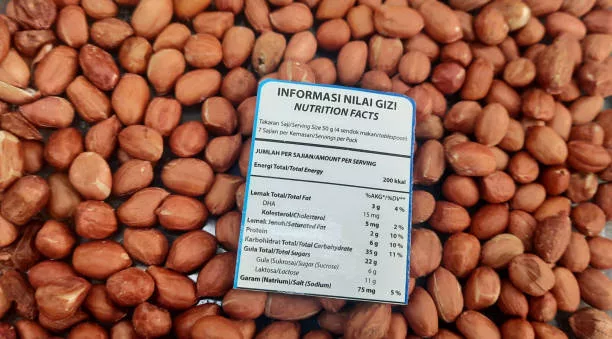
1. Protein:
- Nigerian groundnuts are an excellent source of plant-based protein. They contain about 25-30 grams of protein per 100 grams, making them a valuable addition to the diet, especially for vegetarians and vegans.
2. Healthy Fats:
- Groundnuts are rich in healthy monounsaturated and polyunsaturated fats, which can help reduce the risk of heart disease. They contain no cholesterol and are a source of beneficial fatty acids, such as oleic acid and linoleic acid.
3. Dietary Fiber:
- Nigerian groundnuts provide a good amount of dietary fiber, which aids in digestion and can help maintain healthy cholesterol levels. Fiber also contributes to a feeling of fullness, making them a satisfying snack.
4. Vitamins:
- Niacin (Vitamin B3): Groundnuts are a significant source of niacin, which plays a crucial role in energy metabolism, skin health, and nerve function.
- Folate (Vitamin B9): Groundnuts are rich in folate, essential for DNA synthesis and cell growth, making them particularly important during pregnancy.
- Vitamin E: Groundnuts are a good source of vitamin E, an antioxidant that helps protect cells from damage caused by free radicals.
5. Minerals:
- Magnesium: Groundnuts are a good source of magnesium, which is vital for muscle and nerve function, blood glucose control, and bone health.
- Phosphorus: They also provide phosphorus, necessary for strong bones and teeth.
6. Antioxidants:
- Groundnuts contain antioxidants, such as resveratrol, which can help protect the body’s cells from damage and reduce the risk of chronic diseases.
7. Plant Compounds:
- Resveratrol: This compound is linked to various health benefits, including heart health and longevity.
- Phytosterols: Groundnuts contain phytosterols that can help lower cholesterol levels and reduce the risk of heart disease.
8. Calories:
- Groundnuts are calorie-dense due to their healthy fats, so portion control is essential if you are mindful of your calorie intake.
It’s important to note that while Nigerian groundnuts offer numerous nutritional benefits, they are also calorie-dense. Therefore, moderation is key, especially for individuals watching their caloric intake. Incorporating groundnuts into a balanced diet can be a smart choice, whether as a protein source, a healthy snack, or a delicious ingredient in various dishes.
Health Benefits of Nigerian Groundnuts
Nigerian groundnuts, commonly known as peanuts, offer a range of health benefits when consumed as part of a balanced diet. Here are some of the key health benefits associated with Nigerian groundnuts:
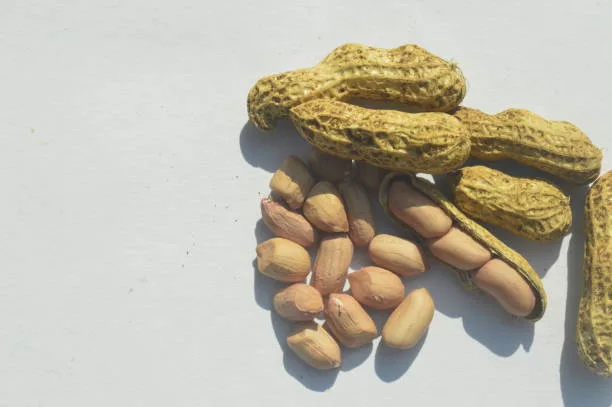
1. Rich Source of Nutrients:
- Nigerian groundnuts are packed with essential nutrients, including protein, healthy fats, vitamins (such as niacin and folate), and minerals (like magnesium and phosphorus). These nutrients are vital for overall health and well-being.
2. Heart Health:
- The healthy monounsaturated and polyunsaturated fats in groundnuts can help reduce the risk of heart disease by improving cholesterol levels and reducing inflammation.
3. Antioxidant Properties:
- Groundnuts contain antioxidants, such as resveratrol and phytosterols, which can help protect cells from oxidative damage and reduce the risk of chronic diseases, including certain types of cancer.
4. Weight Management:
- Despite being calorie-dense, groundnuts can aid in weight management. Their combination of protein, healthy fats, and dietary fiber can increase feelings of fullness and reduce overall calorie intake when consumed in moderation.
5. Energy Boost:
- Groundnuts are an excellent source of energy due to their high-calorie content. They provide sustained energy and are a popular snack for athletes and those with active lifestyles.
6. Digestive Health:
- The dietary fiber in groundnuts supports digestive health by promoting regular bowel movements and preventing constipation.
7. Bone Health:
- Groundnuts are a good source of minerals like magnesium and phosphorus, which are essential for maintaining strong and healthy bones.
8. Skin Health:
- Niacin (Vitamin B3) in groundnuts is beneficial for skin health. It helps maintain the integrity of the skin and may alleviate some skin conditions.
9. Pregnancy Nutrition:
- Groundnuts are rich in folate (Vitamin B9), which is crucial during pregnancy for fetal development and the prevention of birth defects.
10. Reduced Risk of Type 2 Diabetes:
- Consuming groundnuts in moderation as part of a balanced diet may help reduce the risk of type 2 diabetes. The combination of fiber and healthy fats can improve blood sugar control.
11. Cognitive Function:
- Some of the nutrients in groundnuts, including niacin and vitamin E, may support cognitive function and brain health.
12. Versatility in the Diet:
- Groundnuts can be incorporated into various dishes and snacks, making it easy to enjoy their health benefits as part of a diverse diet.
13. Improved Nutrient Absorption:
- The healthy fats in groundnuts can enhance the absorption of fat-soluble vitamins and other nutrients in the diet.
It’s important to note that while Nigerian groundnuts offer numerous health benefits, portion control is essential, as they are calorie-dense. Overconsumption can lead to excess calorie intake. Additionally, for those with nut allergies, caution is necessary, as groundnuts are a common allergen. If you have specific dietary or health concerns, it’s advisable to consult with a healthcare professional or nutritionist for personalized guidance.
Read, Also >>>>>> A Comprehensive Guide to Nutritional, Health Benefits, and Chemical Properties of Nigerian Cocoa
Chemical Properties of Nigerian Groundnuts
The chemical composition of Nigerian groundnuts, also known as peanuts, is quite diverse and includes a wide range of compounds. Here are some of the key chemical properties of Nigerian groundnuts:

1. Macronutrients:
- Proteins: Groundnuts are an excellent source of protein, containing approximately 25-30% of their weight in protein. This makes them a valuable plant-based protein source.
- Fats: Groundnuts are rich in healthy fats, primarily monounsaturated and polyunsaturated fats. These fats include oleic acid and linoleic acid, which benefit heart health.
- Carbohydrates: While groundnuts are not primarily carbohydrate sources, they do contain some carbohydrates, including dietary fiber (about 9-10%) and starch.
2. Vitamins:
- Niacin (Vitamin B3): Groundnuts are a significant source of niacin, a B-vitamin important for energy metabolism, skin health, and nerve function.
- Folate (Vitamin B9): Groundnuts are rich in folate, which is essential for DNA synthesis and cell growth. It is essential for pregnant women.
- Vitamin E: Groundnuts contain vitamin E, an antioxidant that helps protect cells from oxidative damage.
3. Minerals:
- Magnesium: Groundnuts are a good source of magnesium, a mineral that plays a role in muscle and nerve function, blood glucose control, and bone health.
- Phosphorus: They also provide phosphorus, which is crucial for strong bones and teeth.
4. Antioxidants:
- Groundnuts contain various antioxidants, including resveratrol and phytosterols. These compounds help protect cells from oxidative stress and may reduce the risk of chronic diseases.
5. Plant Compounds:
- Resveratrol: This compound, also found in red wine, is known for its potential health benefits, including cardiovascular health and longevity.
- Phytosterols: Groundnuts contain phytosterols, which are plant compounds that can help lower cholesterol levels and reduce the risk of heart disease.
6. Amino Acids:
- Groundnuts contain a variety of amino acids, which are the building blocks of proteins. They include essential amino acids that the body cannot produce and must be obtained from the diet.
7. Starch:
- Groundnuts have a significant starch content, although the amount can vary depending on the variety and maturity of the nuts. This starch can be converted into sugars during roasting or cooking.
8. Flavor Compounds:
- Groundnuts have a unique taste due to the presence of flavor compounds, such as oleic acid, linoleic acid, and various volatile compounds that contribute to their characteristic nutty aroma and taste.
9. Allergenic Compounds:
- Groundnuts are a common allergen and can trigger allergic reactions in some individuals. The specific allergenic compounds responsible for peanut allergies are proteins.
It’s important to note that the chemical composition of groundnuts can vary depending on factors such as the variety of the peanuts, growing conditions, and post-harvest processing. Groundnuts are enjoyed for their diverse chemical properties, which make them not only nutritious but also flavorful and versatile in culinary applications.
Table 1:Proximate Analysis % of Nigerian Groundnut
| Composition | Percentage |
| Moisture | 7.6±0.03 |
| Ash | 4.6±0.07 |
| Crude fibre | 2.9±0.05 |
| Crude protein | 42.61±0.05 |
| Fat | 45.00±0.07 |
| Carbohydrate | 2.91±0.06 |
Table 2: Physico-chemical characteristics of Groundnut oil Extracted From Nigerian Groundnut
| Parameter | Value |
| Saponification value (mgKOH/g) | 182.70 |
| Iodine value (Wijs) | 35.82 |
| Acid value (mgKOH/g) | 5.60 |
| Free Fatty Acids mgKOH/g | 2.80 |
| Peroxide value. | 2.72 |
| Refractive index | 1.447 |
Table 3: Mineral content (mg/100g) of groundnut oiI Extracted from Nigerian Groundnut Oil
| Mineral | mg/100g |
| Na | 39.00±0.72 |
| K | 702.11±0.85 |
| Mg | 4.05±0.04 |
| Ca | 3.02±1.94 |
| Fe | 7.02±1.62 |
| Zn | 3.40±0.11 |
| P | 10.52±0.68 |
Ways to Use Nigerian Groundnuts
Nigerian groundnuts, also known as peanuts, are incredibly versatile and can be used in various ways in cuisine and snacks. Here are some popular and delicious ways to use Nigerian groundnuts:
1. Roasted Groundnuts:
- Roasted groundnuts are a popular snack in Nigeria. They can be enjoyed on their own or with added flavors like salt, pepper, or spices for extra zest. Street vendors often sell them in small bags, making them a convenient and tasty on-the-go snack.
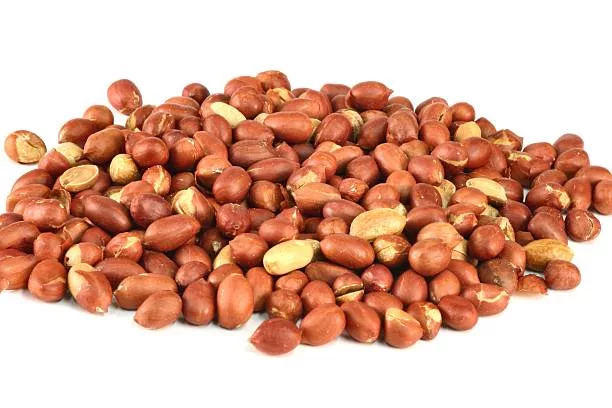
2. Groundnut Soup (Peanut Soup):
- Groundnut soup is a classic Nigerian dish. It’s a rich and creamy soup made with groundnut paste, often mixed with vegetables, meat (like chicken or goat), and spices. It’s usually served with fufu or rice.

3. Groundnut Stew:
- Groundnut stew is a hearty and flavorful dish made by simmering groundnut paste with vegetables, meats, or fish. It’s a delicious and filling meal that’s enjoyed across Nigeria.
4. Groundnut Sauce (Peanut Sauce):
- Groundnut sauce is a versatile condiment that can be served with a variety of dishes. It’s made by mixing groundnut paste with spices, vegetables, and sometimes a bit of tomato. It pairs well with rice, yam, plantains, and more.
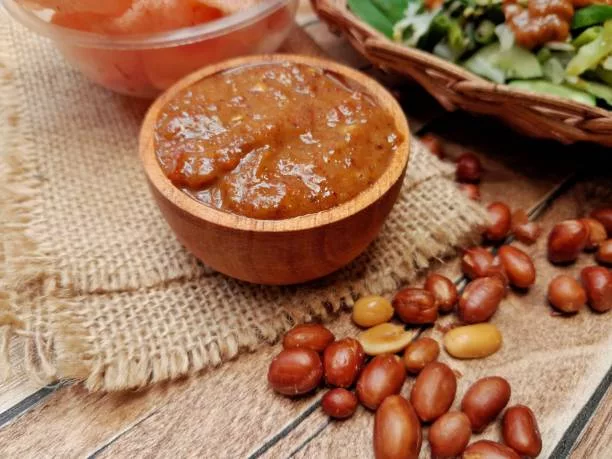
5. Groundnut Porridge:
- Groundnut porridge is a sweet and savory dish made by combining groundnut paste with ingredients like yam, plantains, or corn. It’s a comforting and nutritious meal often enjoyed for breakfast or as a snack.
6. Groundnut Butter (Peanut Butter):
- Groundnut butter is a creamy spread made by grinding roasted groundnuts. It can be spread on bread, crackers, or used as a dip for fruits and vegetables. It’s a delicious and nutritious addition to your diet.
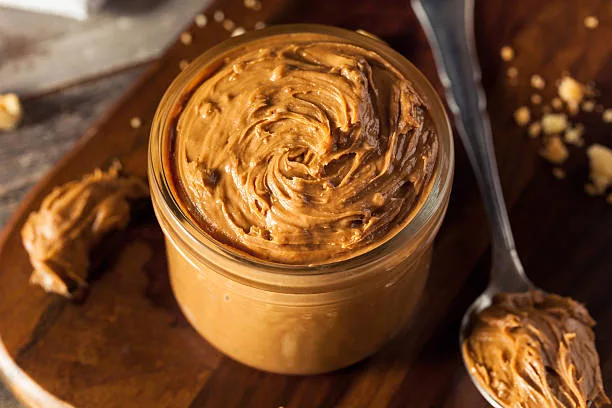
7. Groundnut Snacks:
- Groundnuts can be used as an ingredient in various snacks. For example, they can be incorporated into trail mix, granola bars, and even baked goods like cookies or brownies for a delightful crunch and flavor.
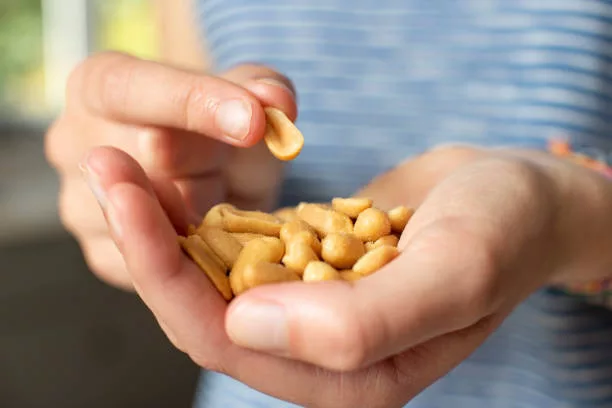
8. Groundnut Oil:
- Groundnut oil, extracted from the nuts, is commonly used for cooking and frying in Nigeria. It has a high smoke point and a mild, nutty flavor, making it suitable for a wide range of dishes.

9. Groundnut Rice:
- Groundnut rice is a popular dish where cooked rice is combined with groundnut sauce, vegetables, and often some protein, creating a flavorful and satisfying meal.

10. Groundnut Suya:
- Suya is a popular Nigerian street food made by skewering marinated meat (such as beef, chicken, or goat) and grilling it. The meat is typically served with a spicy groundnut sauce, adding a delightful nutty flavor to the dish.
11. Groundnut Smoothies:
- Groundnuts can be blended into smoothies for added creaminess and protein. A common combination includes groundnuts, bananas, and milk or yogurt.
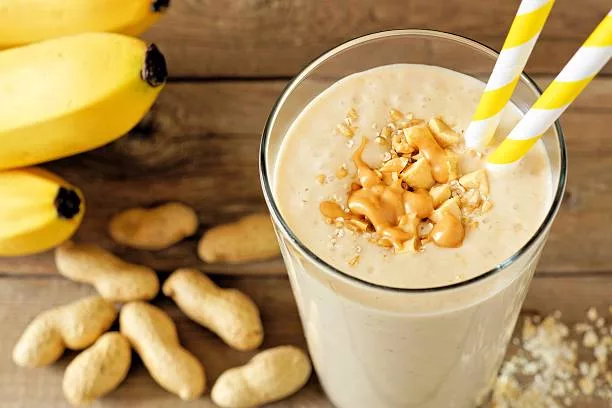
These are just a few of the many ways Nigerian groundnuts can be used in culinary creations. Their rich, nutty flavor and versatility make them a beloved ingredient in Nigerian cuisine, adding depth and taste to a wide array of dishes and snacks.
Recipes Using Nigerian Groundnuts
Here are two popular recipes using Nigerian groundnuts:
1. Nigerian Groundnut Soup (Peanut Soup):
Nigerian Groundnut Soup is a rich and flavorful dish enjoyed across Nigeria. It combines the creaminess of groundnuts with a variety of proteins and vegetables. Here’s how to make it:

Ingredients:
- 2 cups of roasted groundnuts (peanuts), ground into a paste
- 500g of chicken, beef, or goat meat (cut into bite-sized pieces)
- 1 cup of spinach or pumpkin leaves (ugu)
- 1 onion, finely chopped
- 2-3 red bell peppers, blended into a smooth paste
- 2-3 tablespoons of palm oil
- 2-3 scotch bonnet peppers (adjust for spice level)
- 2 stock cubes (seasoning cubes)
- Salt to taste
- Water
Instructions:
- Prepare the Groundnut Paste:
- Roast the groundnuts until they turn golden brown, then remove the skins.
- Grind the roasted groundnuts into a smooth paste using a food processor or mortar and pestle. Set aside.
- Cook the Protein:
- In a pot, sauté the chopped onions in palm oil until they become translucent.
- Add the meat and brown it on all sides.
- Add Groundnut Paste:
- Stir in the groundnut paste and let it cook with the meat for a few minutes.
- Add Peppers and Seasoning:
- Add the blended red bell peppers and scotch bonnet peppers to the pot.
- Crumble in the stock cubes and season with salt.
- Simmer:
- Add water to achieve your desired soup consistency. Allow the soup to simmer on low heat for about 20-30 minutes, stirring occasionally.
- Add Greens:
- About 10 minutes before serving, add the chopped spinach or pumpkin leaves. Let them wilt into the soup.
- Serve:
- Nigerian Groundnut Soup is often served with fufu, rice, or pounded yam.
2. Nigerian Groundnut Snack (Roasted Peanuts):
Roasted groundnuts are a popular and simple snack enjoyed by Nigerians. Here’s how to make them:
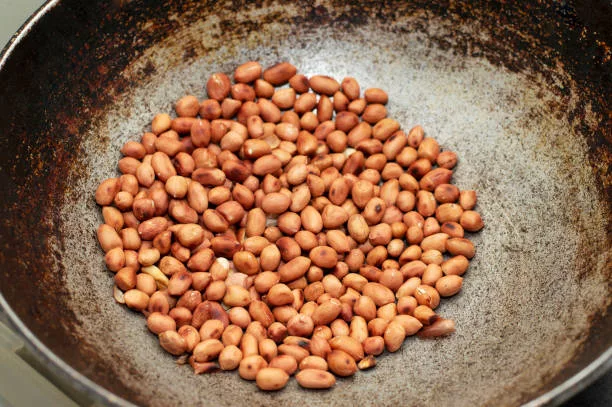
Ingredients:
- Raw peanuts (groundnuts)
- Salt
- Optional: cayenne pepper, garlic powder, or other seasonings for extra flavor
Instructions:
- Prepare the Groundnuts:
- Start with raw peanuts. Remove any debris or shells.
- Roasting:
- Heat a pan or oven to around 350°F (175°C).
- Spread the peanuts in a single layer on a baking sheet or in a dry pan.
- Roast:
- Roast the peanuts for about 15-20 minutes in the oven, or on the stovetop, stirring occasionally to ensure even roasting.
- Season:
- Remove the roasted peanuts from the heat and season with salt or any desired spices. Toss the peanuts to coat them evenly.
- Cool:
- Let the peanuts cool before enjoying your homemade roasted groundnuts.
These two recipes showcase the versatility of Nigerian groundnuts, whether used in a savory, hearty soup or as a delicious roasted snack. Enjoy your culinary adventure with this versatile ingredient!
Potential Side Effects and Things to Remember
Nigerian groundnuts (peanuts) are a nutritious and versatile food, there are some potential side effects and considerations to keep in mind when incorporating them into your diet:
1. Allergies:
- Peanut allergies are common and can be severe. Some individuals are hypersensitive to peanuts and can experience symptoms ranging from mild itching to life-threatening anaphylaxis. If you or someone you’re serving has a known peanut allergy, extreme caution is necessary, and it may be best to avoid peanuts altogether.
2. High in Calories:
- Groundnuts are calorie-dense due to their healthy fats. If you are mindful of calorie intake, consume them in moderation. Overeating peanuts can lead to excess calorie consumption, which may contribute to weight gain.
3. Aflatoxins:
- Peanuts are susceptible to contamination by a toxin called aflatoxin, produced by molds. Aflatoxins can be harmful to health and have been linked to liver cancer. Ensure you purchase peanuts from reliable sources and store them properly to reduce the risk of aflatoxin contamination.
4. Oxalates:
- Groundnuts contain oxalates, compounds that can contribute to kidney stone formation in susceptible individuals. If you are prone to kidney stones, consult a healthcare professional for dietary recommendations.
5. Portion Control:
- Be mindful of portion sizes when consuming peanuts, especially if you’re watching your calorie intake. A small serving can be quite satisfying due to their healthy fats and protein content.
6. Nutrient Absorption:
- Groundnuts, like many nuts and seeds, contain phytates that can inhibit the absorption of certain minerals, such as iron and zinc. If groundnuts are a significant part of your diet, consider diversifying your sources of these minerals.
7. Choking Hazard:
- Groundnuts, especially when served to children or the elderly, can be a choking hazard. Always ensure that peanuts are served in a form that is safe to consume.
8. Roasting and Frying:
- When preparing roasted peanuts or using peanut oil for frying, be cautious with high-temperature cooking methods. Heating peanut oil beyond its smoke point can result in the production of harmful compounds.
9. Salt and Seasonings:
- Many commercial peanut products are heavily salted and may contain artificial flavorings or preservatives. Be mindful of your sodium intake, especially if consuming salted peanuts.
10. Storage:
- To prevent spoilage and aflatoxin contamination, store peanuts in a cool, dry place, and consume them within a reasonable time frame. Keep them in an airtight container to maintain freshness.
while Nigerian groundnuts are a delicious and nutritious food, it’s important to be aware of potential allergies, calorie content, aflatoxin contamination, and other considerations to enjoy them safely and in a health-conscious manner. If you have specific dietary concerns or health conditions, it’s advisable to consult with a healthcare professional or nutritionist for personalized guidance.
In summary, Nigerian groundnuts, commonly known as peanuts, are a versatile and nutritious food enjoyed in various forms in Nigerian cuisine and around the world. They offer several health benefits, including being a rich source of protein, healthy fats, vitamins, and minerals. When used wisely in the diet, groundnuts can contribute to heart health, provide sustained energy, and support various bodily functions.
However, it’s crucial to be aware of potential side effects, such as allergies and calorie density. Allergies to peanuts can be severe, so caution is necessary if you or someone you’re serving has a known allergy. Additionally, mindful portion control is essential to avoid excess calorie consumption.
Proper storage and careful preparation can mitigate the risk of aflatoxin contamination, a potential concern with peanuts. It’s also wise to diversify your mineral sources if groundnuts are a significant part of your diet.
Incorporating groundnuts into your meals and snacks can add flavor, nutrition, and versatility to your culinary adventures. Just be sure to consider individual dietary needs and preferences when enjoying this beloved legume.
Read, Also >>>>>> A Comprehensive Guide to Nutritional, Health Benefits, and Chemical Properties of Nigerian Cocoa





